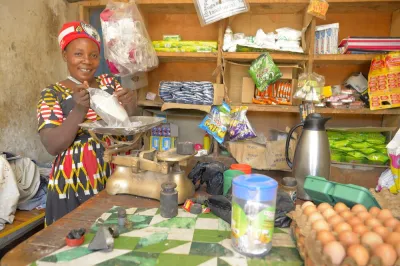Don’t Let Digitization Create More Inefficiencies

Faisal Abdul Wahab is a managing partner at PCES and currently manages the Ghana Office and all operations in Africa. Faisal has more than a decade of experience as an IT specialist with extensive management responsibilities and practical knowled ge of the challenges related to IT for financial institutions in the African context. His track record of implemented projects is vast, ranging from implementation of digital payment platforms to leading core banking system migrations in six different financial institutions in Africa as well as application development to support the digitization along agricultural value chains.
At this year's European Microfinance Week, Faisal Abdul Wahab participated in the panel called "Fintegration: Innovation Meets Legacy Systems." FinDev Gateway caught up with him afterwards to learn more about fintegration and how his company helps MFIs on their path to digitization.
FinDev: What is PCES and what role does it play in the financial inclusion space?
Faisal: PCES is a company which offers consulting services and tailored IT solutions for financial institutions. We act as translator, facilitator and moderator between IT and business, establishing integrated solutions for digitization. Some of these solutions include:
- USSD-based applications to enable alternative delivery channels.
- PCES Broker, a middleware that converts legacy systems into flexible and responsive IT environments.
- fin-BITS, a proprietary MSME Finance business process management tool that enables data-based decision-making, product development and risk management.
FinDev: Who are your clients?
Faisal: We support development finance institutions (DFIs) in due diligence missions, and financial service providers (FSPs) in the revision and improvement of systems and organizational structures. We work with FSPs in Sub-Saharan Africa and Southeast Europe, as well as funds and international consulting companies. Since our experience is multi-faceted, we cater to all kinds of FSPs - from credit cooperatives to banks and, for example, agribusinesses that seek to digitize cash-based transactions.
Unfortunately, a limited understanding of how both IT and financial services work has led to major frustrations in many migration, digitization and platform integration projects.
FinDev: What makes you different from other firms working in this area?
Faisal: Our intersectoral expertise. We offer the unique combination of strong technical expertise and a deep understanding of banking processes. Hence, we are neither a “classical” software vendor nor a digital financial services (DFS) consulting company; rather we provide digital solutions to observed gaps and challenges. We even support some partners in the selection and procurement process of, for example, a new Core Banking System.
FinDev: Why is this combination of expertise important for digital transformation?
Faisal: Unfortunately, a limited understanding of how both IT and financial services work has led to major frustrations in many migration, digitization and platform integration projects. We come across a lot of institutions that try to fit their business model to an IT system that they have implemented, simply because the system is too rigid to customize to the needs of the institution or too expensive to do so. As a result, they end up with partially digitized processes which introduce even more inefficiencies.
FinDev: So, are you saying that in some cases digitization can lead to more problems?
Faisal: Absolutely. If not done right, digitization can introduce more inefficiencies. Most MFIs, due to their resource constraints (especially in IT), tend to go for off-the-shelf solutions which are not tailored to their specific needs. Therefore, they end up with unproductive or inefficient processes, or simply lose their technological edge due to the difficult adaptation period and resulting user reluctance.
We do not offer off-the-shelf solutions. Instead, we take a holistic approach starting with advising FSPs on the most suitable tool, managing the implementation of the project and providing the maintenance required. In other words, we act as the external IT department of the institution, covering most of the IT services needed for daily operations. This helps keep the cost down due to more efficient coordination as opposed to engaging several consultants or companies to offer these services independently.
FinDev: The European Microfinance Week panel, “Fintegration: When Innovation Meets Legacy,” featured your partnership with Equity Bank DRC (Democratic Republic of Congo). How did PCES help Equity Bank digitize?
Faisal: PCES was contracted by Equity Bank DRC for the development and deployment of a payment hub: a payment platform that integrates the bank with various third-party platforms and FinTech, and provides a unified user interface across all delivery channels (mobile, USSD, Telegram, ATM and POS). Because of this project, Equity DRC is now able to offer these partners’ services via all delivery channels. Clients can make payments from bank account for bills, transfer funds from bank account to mobile wallets and vice versa, or allow a mobile network operator (MNO) to use the bank’s ATM network for withdrawal from mobile wallets.
FinDev: What were the key factors that made this project successful?
Faisal: The key success factor was transforming the legacy system into a responsive environment providing open APIs (application program interfaces) with which the bank’s partners (MNOs, utility companies and card processor) could easily integrate. This was made possible by the PCES Broker, a dedicated middleware that acts as a central point of integration. As all the “heavy lifting” is done by PCES Broker, the MNOs and utility providers only need to integrate to the hub; they don’t have to worry about how to interact with another partner’s system or the core banking system of the bank; this is handled by PCES Broker.
For example, we integrated the payment hub with Vodacom mPESA. This allows mPESA clients to request a withdrawal code on mPESA’s USSD platform to use any of Equity DRC’s ATMs as cash-out points from their mPESA account. The entire integration project took two months from requirement definition until the first transaction was performed. Yet once this first integration was completed, subsequent integrations of mPESA to bank accounts and vice versa took only two weeks to complete.
My advice? Invest in flexible systems that strengthen rather than undermine your institutional agility.
FinDev: If you could highlight one key challenge, what would it be and how did you overcome it?
Faisal: A very common challenge in these projects is coordination between technical and business teams.
For the Equity DRC project, coordination challenges between technical and business teams were avoided by a solid project management structure that involved all stakeholders at a conceptual stage and emphasized continuous discussions to assure stakeholder alignment. This assured a common understanding of “where we stand” at any point in time, assuring counterparty buy-in and cooperation. The management of Equity Bank DRC understood and appreciated from the very beginning a) their internal IT capabilities, b) the value of specialized external consultants in driving project management, and c) the value a responsive and interoperable system architecture.
FinDev: Based on what you have learned from your work so far, what advice would you offer to MFIs as they consider digital transformation?
Faisal:
- Consider the bigger picture: The sector is very focused on innovative delivery channels and applications to digitize loan origination; the bigger picture of digital transformation, particularly in terms of the business model and operational processes, often gets lost.
- At the European Microfinance Week panel we co-organized with FMO and Triple Jump, we developed a Fintegration Checklist with three main dimensions: IT systems, Strategy and Change Management. All these dimensions are essential in a successful digital transformation; the FSPs must be committed and know that their work does not stop with the selection of a vendor.
- Invest in flexible systems that strengthen rather than undermine your institutional agility (i.e. your ability to integrate new digital solutions). The landscape is ever-changing and nobody can predict the solutions, technologies or companies that will dominate the market five years from now. You want to make sure that the system you choose now will not set you down a narrow path that limits your options in the future.
- Assign or hire a dedicated project manager for sizable transformation projects to avoid relying completely on the software vendor.
- In summary: Give us a call!
FinDev Gateway is proud to be a media partner for European Microfinance Week. Read more blog posts and interviews from our partnership:
-
How Did Advans Côte d'Ivoire Win the European Microfinance Award?
-
What Is Crowdfunding and How Could It Help Financial Inclusion?
-
Go Big by Going Small: Serving the Needs of Smallholder Farmers


